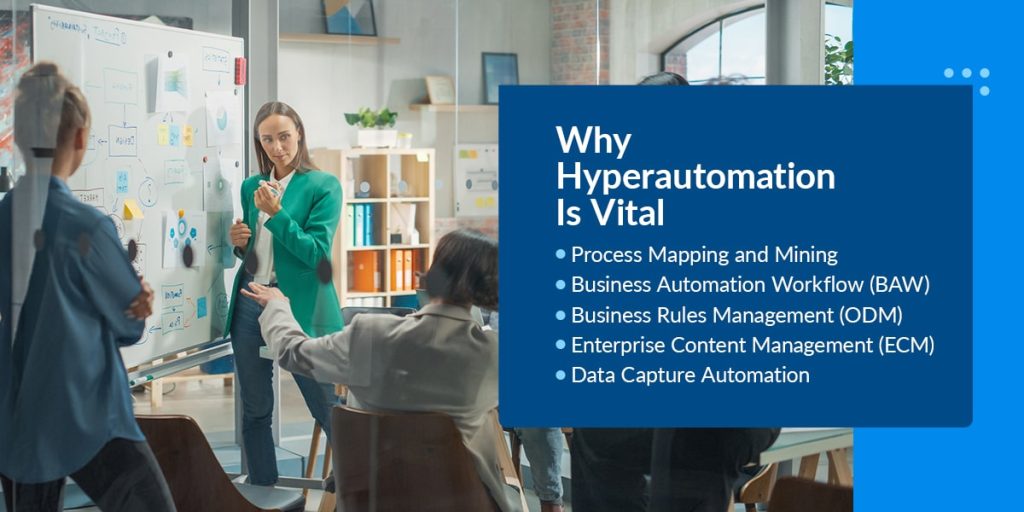
Automation is the current buzz. If organizations haven’t already started implementing automation, now is the time to start. Automation holds immense potential, encouraging organizations to place higher value on employee satisfaction and improving productivity. Investing in business process automation is a quick way to improve overall workflow and efficiency. Digital Business Automation, the integration of advanced technologies to automate complex business processes, is an emerging industry concept that demands consideration from businesses worldwide.
Digital Business Automation versus automation, deciding which process solution will suit your business the best depends on your specific needs. Understanding the differences between automation and Digital Business Automation helps companies to determine which technologies will best suit their long-term goals and current organizational needs.
The main difference between Intelligent Automation and Digital Business Automation is the scope and capabilities. While Intelligent Automation aims to enhance efficiency, Digital Business Automation surpasses this by encompassing holistic process optimization, agility and innovation. As an extension of automation, Digital Business Automation kicks things up a notch by adding advanced technologies to the automation process. While the former focuses on automating only specific tasks, the latter extends automation’s capabilities.
Automation allows businesses to use technology, tools, or systems to perform tasks, processes, or operations. Automation can free workers from mundane, repetitive tasks, allowing them to focus on value-adding work. Think about the technology that goes into computers. Software or machines take over repetitive tasks and other rule-based activities to streamline operations, especially administrative tasks. Businesses’ process automation can save time, reduce errors and increase workflow efficiency. Mundane processes that are easily automated include:
Organizational departments that benefit most from automation software include human resources, sales, project management, customer support, and operations management. Aside from increased productivity, making the switch to automation will also:
Digital Business Automation is a business-driven, iterative, disciplined approach to automation and combines different technologies and tools to create an end-to-end automated ecosystem. Artificial intelligence (AI), Machine Learning (ML), Natural Language Processing (NLP), and RPA are a few of the advanced technologies that take workflow efficiency to the next level. The goal is to automate everything in an organization that can benefit from automation by creating an intelligent and agile system that evolves with the company’s growing needs and drives transformative results. Think of Digital Business Automation as a bundle consisting of automation tools, packaged software, and intelligence like ML or AI.
Inserting this technology into business architecture opens a door to improve turnaround times for key processes within the organization, gives employees more time to focus on high-end work as AI completes manual tasks, and creates a more supportive environment for employees, with the bonus of happy customers, thanks to consistent, high-quality work or service provision.

Maximize productivity, minimize overheads, and enjoy a new level of performance at work with Hyperautomated solutions. Businesses that need to keep up with increased demand, create new work processes, encourage employee growth, and boost consistency will benefit from Digital Business Automation. By stepping into this future, businesses will enjoy a positive change in legacy operations, reduced costs, and increased data accuracy. They’ll also see improved customer experiences due to more consistency in deliverables. Here are five game-changing Digital Business Automation capabilities:
Thanks to endless software customization opportunities, Digital Business Automation benefits most businesses in almost any industry.
Three industries that can benefit the most are:
Careful analysis and understanding of your business needs are essential to determine if this technology integration aligns with your goals. Speaking with automation experts and evaluating successful cases in your industry will provide you with valuable insights to factor into your decision-making.

Businesses can unleash their full potential by making informed choices between automation and scaling beyond toward Digital Business Automation, seizing new opportunities, and paving the way for a prosperous and resilient future.
At Salient Process, we value the significance of a holistic digital transformation. Our goal is to help you to align your procedures with overarching business objectives. Our dedicated team diligently grasps your specific requirements, crafting personalized plans for success. With our Digital Business Automation solutions, your business can quickly meet its digital transformation goals, taking the whole organization to new heights of efficiency and innovation.
Revolutionize your business today. Request a free consultation with Salient Process.